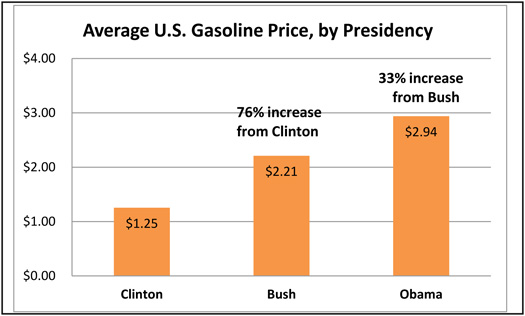The Republican presidential campaign recently produced a couple of characteristic bits of what Americans, for lack of a better word, call “news”: Newt Gingrich declaring that New Yorkers “live in high rises and ride the subway” and thus don’t care about gasoline prices; and Tea Party “activists” in Virginia, Florida and Maine convinced that smart-growth initiatives are — wait for it — a UN plot!
Unfortunately, nuttiness like this is no new thing, and its reach is longer than you might think. It has its roots in an antiquated and peculiarly American belief system that is standing in the way of improved urban livability.
Let’s start with gas prices. In recent weeks, Gingrich, Mitt Romney, and House Speaker John Boehner have all played to the notion that gas prices have doubled since President Obama took office. The price of gas is notoriously volatile; the national average price has actually fallen in 45 of the past 100 months (Excel spreadsheet). So a fair accounting would employ the U.S. average over an entire presidency, as in this chart, for the three most recent:
The chart makes clear that it was former oilman George W. Bush, not Obama, who came closest to presiding over a doubling of gas prices.
At one level, Gingrich and company are merely shilling for the Keystone XL pipeline. But of course excavating Canadian tar sands oil and piping it to Houston is so costly and energy-intensive that without high gas prices, the venture would collapse.
That aside, consider what Gingrich is really saying when he derides New Yorkers as elitists because each uptick in the price of gas doesn’t make us itchy to start a new war. In one way, he has a point. Unlike our countrymen trapped in punishing commutes and paying off two-car garages, we big city dwellers are fairly well insulated from fluctuating gas prices. And unlike big-box suburbs and the Sunbelt, which were built on the inefficiency of cars, highways, supersized houses and office parks, New York is built on the efficiency of dense neighborhoods and public transportation.
To anyone with common sense, that difference makes the ‘burbs brittle and cities resilient. To Newt, it makes city dwellers suspect.
Similarly suspect, in the eyes of Tea Party activists, are “all sorts of local and state efforts to control sprawl and conserve energy,” as the Times reported on Saturday. “Government action for things like expanding public transportation routes and preserving open space [is seen] as part of a United Nations-led conspiracy to deny property rights and herd citizens toward cities.” Ditto, bike lanes. And, you better believe, congestion pricing or any form of traffic pricing.
What’s at work here, according to the writer (and New Yorker) Dan Lazare, is the “Jeffersonian ideology that assumed that individual actions were autonomous unless proven otherwise. Whether a motorist chose to drive or not to drive,” Lazare wrote in his 2000 classic, America’s Undeclared War: What’s Killing Our Cities and How You Can Stop It, “was nobody’s business but his own; any suggestion to the contrary was positively un-American.”
The standard counterweight to the agrarian Jeffersonian model is the Hamiltonian sovereign nation-state drawing strength from cities built on manufacturing and trade. Lazare plumbed this duality in America’s Undeclared War, but he also broke new ground by contrasting Jeffersonianism to the “theory of externalities” that emerged in the early 20th Century, which emphasized “the public dimension of individual acts” that consumed resources or otherwise damaged the commons:
Rather than regarding individual acts as private unless proven otherwise, the growing volume of external costs suggested that they had to be regarded as public acts — unless, that is, affirmative action was taken to mitigate the social consequences. To drive or not to drive, in other words, was no longer an individual decision but a social question because so many people were affected besides the motorist himself.
A great many people are affected by an individual’s decision to drive in NYC. I have shown elsewhere that a single car round-trip into the Manhattan Central Business District generates external costs on the order of a hundred dollars, just in terms of other road users’ lost time. Although the Bloomberg administration didn’t use this meme in its 2007-2008 push for congestion pricing, it is the essential motivating idea behind tolling vehicles entering the CBD. As I wrote on Reuters last month, any New York-area driver “is cognizant of the time he will expend being slowed by other cars, but not of the far greater delays he will impose on them.” A congestion toll helps close that feedback loop.
Tea Partiers are having none of that, of course, and Dan Lazare helps us make sense of their antipathy to treating driving -- not to mention land use, transit provision, and climate change -- as a social question rather than the sole province of individuals. To paraphrase America’s Undeclared War, “Where the externalities analysis highlights the tyranny that a mass of atomized individuals imposes on society, adherents of Jefferson worry about the tyranny imposed by society on the individual.”
In short, congestion pricing’s benefits be damned, you’ll still have to pry the car keys out of my cold dead hand.






